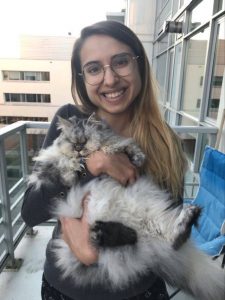We chat with third-year MD/PhD Candidate, Shayda Swann.

Tell us a little bit about your research project.
My project focuses on healthy aging in women living with HIV, from cell to society! I’m part of the “British Columbia CARMA-CHIWOS Collaboration” (affectionately known as BCC3), a community-collaborative study that will be collecting clinical samples (everything from blood to cheek swabs to hair samples!) and survey data from a cohort of women living with and without HIV. We’ll then use that data to analyze how cellular, clinical, and psychosocial factors contribute to the aging process. My project will specifically focus on the role of ovarian hormones in cellular aging and risk of age-related comorbidities, and how this relationship might be modulated by socio-structural factors. If you’re interested in learning more about our study, check out our snazzy new website: https://hivhearme.ca/
What do you find interesting in this field of research?
HIV is likely one of the most thoroughly researched viruses out there, but people living with HIV continue to face a substantial and unacceptable amount of stigma. I’m very proud to be part of a team that is not only very interdisciplinary, but who also respect and embrace the power of living and lived experience in research. I have the privilege of working with and learning from an incredible team of Peer Research Associates (women living with HIV with research training), who contribute their community expertise at each stage of the research
process, from study design and data collection to knowledge translation.
What is one of your favourite project-related memories?
My favorite memory (so far!) is our first Community Advisory Board meeting that took place this past International Women’s Day. It was so much fun to help put together the slides and help to share our work with a diverse community of clinicians, members of organizations, and other community representatives. The best part was the end of the meeting where we asked each member to say one word that comes to mind when they think about the BCC3 study. It was so heartwarming to hear people say things like “empowerment”, “relevant”, and “compassionate”.